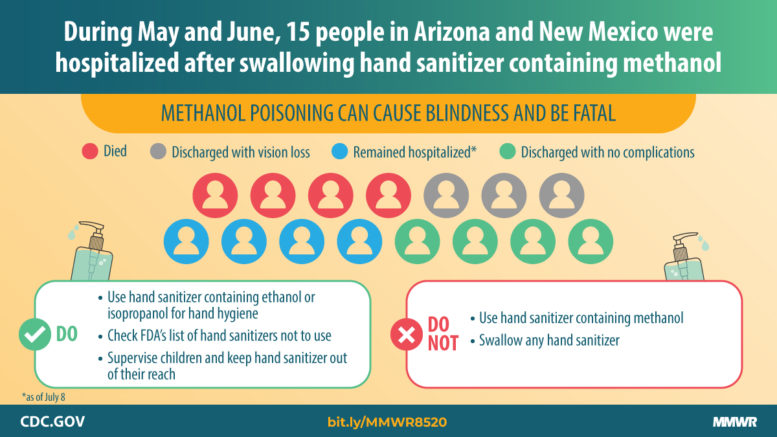Yip, et al. (2020) report in the latest issue of the CDC's Morbidity and Mortality Weekly Report on reported cases of methanol poisoning associated with ingestion of alcohol-based hand sanitizers.
According to the Food and Drug Administration (FDA), which regulates alcohol-based hand sanitizers as an over-the-counter drug, methanol (methyl alcohol) is not an acceptable ingredient. Cases of ethanol toxicity following ingestion of alcohol-based hand sanitizer products have been reported in persons with alcohol use disorder. On June 30, 2020, CDC received notification from public health partners in Arizona and New Mexico of cases of methanol poisoning associated with ingestion of alcohol-based hand sanitizers. The case reports followed an FDA consumer alert issued on June 19, 2020, warning about specific hand sanitizers that contain methanol. Whereas early clinical effects of methanol and ethanol poisoning are similar (e.g., headache, blurred vision, nausea, vomiting, abdominal pain, loss of coordination, and decreased level of consciousness), persons with methanol poisoning might develop severe aniongap metabolic acidosis, seizures, and blindness. If left untreated methanol poisoning can be fatal.
The CDC and state partners established a case definition of alcohol-based hand sanitizer– associated methanol poisoning and reviewed 62 poison center call records from May 1 through June 30, 2020, to characterize reported cases. Medical records were reviewed to abstract details missing from poison center call records. During this period, 15 adult patients met the case definition, including persons who were American Indian/Alaska Native (AI/AN).
All had ingested an alcohol-based hand sanitizer and were subsequently admitted to a hospital. Four patients died and three were discharged with vision impairment. Persons should never ingest alcohol-based hand sanitizer, avoid use of specific imported products found to contain methanol, and continue to monitor FDA guidance.
The researchers say that clinicians should maintain a high index of suspicion for methanol poisoning when evaluating adult or pediatric patients with reported swallowing of an alcohol-based hand sanitizer product or with symptoms, signs, and laboratory findings (e.g., elevated anion-gap metabolic acidosis) compatible with methanol poisoning. Treatment of methanol poisoning includes supportive care, correction of acidosis, administration of an alcohol dehydrogenase inhibitor
(e.g., fomepizole), and frequently, hemodialysis.
A case of alcohol-based hand sanitizer–associated methanol poisoning was defined as detectable blood methanol concentration and a history of alcohol-based hand sanitizer exposure (e.g., ingestion, dermal, ocular, inhalation, or injection) in any person who sought medical attention in Arizona or New Mexico during May 1–June 30, 2020. To identify and characterize cases, CDC collaborated with Arizona Department of Health Services, Arizona Poison and Drug Information Center
Reference: Yip L, et al. Serious Adverse Health Events, Including Death, Associated with Ingesting Alcohol-Based Hand Sanitizers Containing Methanol — Arizona and New Mexico, May–June 2020. Morbidity and Mortality Weekly Report. Vol. 69. Aug. 5, 2020.

Be the first to comment on "Researchers Report on Cases of Ingestion of Alcohol-Based Hand Sanitizers Containing Methanol"